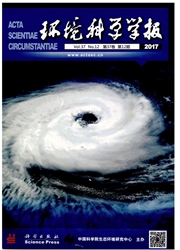

 中文摘要:
中文摘要:
在蚯蚓堆肥过程中,温度会对微生物和蚯蚓活性产生影响,进而影响堆肥效率.将城镇脱水污泥制成5 mm的颗粒,通过比较3个温度条件下(15、20、25℃)赤子爱胜蚓(Eisenia foetida)处理城镇污泥过程中理化、生化指标的变化,研究温度对蚯蚓堆肥稳定化过程的影响.结果显示,在整个稳定化过程中,随温度升高,有机质(OM)、微生物量碳(MBC)降低,电导率(EC)、NH4^+-N、NO3^--N升高,而脱氢酶活性(DHA)随温度变化不具有明显规律性.主成分分析(PCA)结果表明,蚯蚓堆肥稳定化过程依次经历以有机质生物降解、氨化和硝化为特征的3个阶段.以蚯蚓适宜生长温度控制蚯蚓堆肥,将更有利于蚯蚓与微生物协同作用的高效发挥.温度能改变蚯蚓堆肥的稳定化效率,但并不改变稳定化路径.
 英文摘要:
英文摘要:
Temperature can influence the activity of microorganisms and earthworms,and then impact the efficiency of vermicomposting. This study was conducted to elucidate the effects of temperature on vermicomposting stabilization process. The changes of the physicochemical and biochemical properties were compared to investigate the dewatered municipal sludge that was regulated into 5 mm particles and was inoculated earthworm Eisenia foetida at three different temperature conditions( 15 ℃,20 ℃,25 ℃). The results show that the content of organic matter and microbial biomass carbon reduced,while conductivity,NH4^+-N,NO3^--N increased with the increase of temperature. In addition,dehydrogenase activity was irrelavent to the change of temperature.Furthermore,the results of Principal components analysis suggest that the stabilization process of vermicomposting had three stages with the different characteristics including the biological degradation of organic matter,ammonification and nitrification. The optimal temperature for the growth of earthworm would be more efficient on the synergistic effect between earthworms and microorganisms during vermicomposting. Temperature influences stabilization efficiency of vermicomposting,but does not change the stabilization path.
 同期刊论文项目
同期刊论文项目
 同项目期刊论文
同项目期刊论文
 Feasibility of vermistabilization for fresh pelletized dewatered sludge with earthworms Bimastus par
Feasibility of vermistabilization for fresh pelletized dewatered sludge with earthworms Bimastus par 期刊信息
期刊信息
